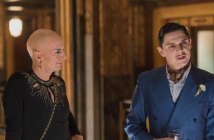May 17, 2015, 9:00 p.m. (EST), HBO
The past is a vital thing on Game of Thrones. History drives much of how these characters think about the world and the political situations they find themselves in. It’s not an exaggeration to say that many of the most important events in the show’s narrative took place before it even began, and the effects of Robert’s Rebellion and the ways it shook up the power structure of Westeros are still rippling out from that decades old event. “Unbowed, Unbent, Unbroken” is full of moments when the past, be it personal or political, holds sway over the present, extending its influence over the way that nearly everyone thinks and feels. History is still being written, one day at a time, a complex linear story that builds from beyond our greatest imagining toward a future we cannot even begin to comprehend. It’s pushing these characters forward, every step of the way.
In Braavos, Arya is being confronted with the idea that to become one of the Faceless Men, she will have to abandon her past, let go of herself entirely, lose what drives her and what makes her a person at all. It’s a fascinating conundrum, as Jacqen Hagar continues to drill into her that in order to get what she wants, she has to let go of all of the things that make her want it. To become the person Arya Stark hopes to be, Arya Stark must cease to be. It’s an open question how much this practice is actually just training Arya to be an ultimate liar, someone who can subsume her identity within a character fully enough to convincingly pass as someone else. The Faceless Men appear to have a strict code, a central tenet of which is that its members are all “no one.” But Arya Stark has refused to give up who she is, hiding needle in the rocks outside the House of Black and White, and keeping her own personal hit list fresh in her mind. Arya’s goals go against the tenets of the Faceless Men, but that doesn’t mean she must lose herself to become one of them. The lesson of the game of lies she plays with Jaqen tonight seems clear to me: lie well enough to fool a Faceless Man, and Arya’s agenda will be something only she can know.
Elsewhere in Essos, Jorah and Tyrion have a heart to heart in which Tyrion explains what brought him across the Narrow Sea and accidentally tells Jorah his father is dead. Both men are attempting to escape their pasts on this journey, to erase past mistakes and secure a future they think they deserve. Both are killers who have disgraced their family name, both are cynics (or, if Jorah’s claims can be believed, a cynic and a reformed cynic), and both have a greater capacity for compassion than their reputation indicates. Their conversation on the beach is a reminder that, for all that the world sees these two as villains, and for all they may see each other as adversaries, they are both deeply human, scarred by their pasts and struggling valiantly for a better future. Even at Tyrion’s most overtly cynical this week, he’s nowhere near nihilism. Tyrion doesn’t damn the world, he just asks “then what?” He wants, more than anything, for a cause to believe in, for a reason to be a righteous man. He’s just smart enough to pick out fallacies in reasoning and to be skeptical of anyone who claims to be “destined to rule.” Tyrion doesn’t like entitlements rooted in the past, not when he’s running so very quickly away from his own.
Cersei’s entire plan this season is based on a blinkered, ultimately short-sighted view of the past. She sees reviving the Faith Militant, an article of history, as a way to regain power in King’s Landing by toppling the Tyrell sphere of influence and regaining primacy in Tommen’s mind. What she has failed to grasp is that, in her short-term attempts to lash out at an enemy, she has given great power to an organization that has no real fear of taking on the crown directly. She’s created an enemy far more powerful and dangerous than the one she is using it to attack. The Faith Militant are zealots, which makes them very difficult to manipulate, and their arrest of Margaery, though completely in line with Cersei’s plan, should show her just how dangerous they may be to her long-term goals.
One of the show’s biggest missteps as it has moved further away from the books this season is the way it has simplified some political calculations to make them far less layered and interesting (this paragraph will discuss events in the books, but I am not considering it a spoiler, since the show has diverged so much at this point. Still, if you want to remain totally unaware of anything that happens in the books, skip to the next one). In three ways tonight, the show has taken short cuts or divergences that render what happens and what may follow from it far less interesting. First, there is the Sand Snakes plan to kidnap and kill Myrcella. In the books, Arianne Martell (daughter of Doran Martell, and a character missing from the show) hatches a plan to use the laws of Dorne, a matriarchy, to crown Myrcella Queen of Westeros after Joffrey’s death, and to set off a civil war between Lannister factions fighting for the Iron Throne. It’s a brilliant plan, and much more elegant as a means of revenge than Ellaria Sand’s “they killed Oberyn, let’s kill Myrcella” machinations here. Second, there is Littlefinger’s (apparent) betrayal of Sansa. In the books, Littlefinger hopes to marry Sansa off to the heir to the Vale (on his assumption that Robin Arryn will not live to maturity, due to his illnesses) and then lay claim to Winterfell once she has been revealed and married off to a powerful ally. In the books, Littlefinger is effectively betraying the Lannisters and setting himself against the Boltons as Wardens of the North, in effect creating another powerful faction in the struggle for the Iron Throne. The show has eliminated Ramsay’s marriage to a fake Arya Stark (who was, in fact, Sansa’s childhood friend Jeyne) and instead slotted Sansa into that role. This is the third divergence, and Sansa’s marriage to Ramsay makes the political situation in the North much more simplistic, even as it creates some character conflicts (the effects of which we will talk about once I get out of this spoiler-ish paragraph).
The rape of Sansa Stark tonight is one of those moments that I would not blame someone for treating as the last straw. Her storyline has basically been torture porn from season one on, and combining her further degradation with Theon’s endless emasculation and torture is just too much. The moment when Sansa seizes her agency and tells Miranda off is undercut immediately by her subsequent sexual assault. The show seems to be building Sansa up as a formidable politician and a master manipulator, but her moments of triumph, or even moments of not being horribly depressed, oppressed, violated and disrespected are so few and far between, the arc isn’t working for me. It takes a character who is finally coming into her own and leads her down a road of further (and, as I see it, narratively unnecessary) suffering.
“Unbowed, Unbent, Unbroken” relies heavily on the history of this show for its power, even as it uses some shortcuts that blunt its overall effectiveness as an episode and as a chapter in the larger story it is so often hinting at throughout its runtime. There are moments here that work, but just as many that feel like short-hand when elaboration was necessary. This isn’t a table-setting episode, not really. But its an episode that draws all of its power from what’s come before and what may be coming soon. Humorously, this is a narrative problem the books ran into at roughly the same point in the story, the moment when the past has been sufficiently laid out, and the future isn’t coming quite quickly enough.
The Roundup
- “I’m not playing this stupid game anymore!” “We never stop playing.”
- “We both peddle fantasies, Brother Lancel. Mine just happen to be entertaining.”
- “And once we’ve got the princess?” “I like to improvise.” “That explains the golden hand.”
- “Let’s not do something stupid…That was something stupid.”
- “Ah, yes. The famously tart-tongued Queen of Thorns.” “And the famous tart Queen Cersei.”
- “As for your veiled threats…” “What veil?”
- “I am Sansa Stark of Winterfell. This is my home. And you can’t frighten me.”
“Unbowed, Unbent, Unbroken” is full of moments when the past, be it personal or political, holds sway over the present, extending its influence over the way that nearly everyone thinks and feels.
-
GOOD




